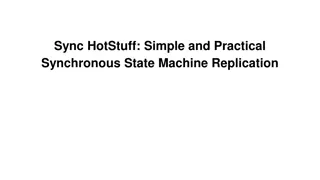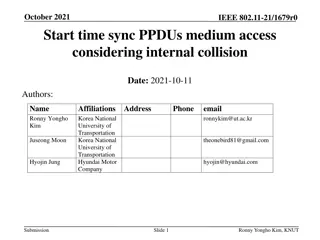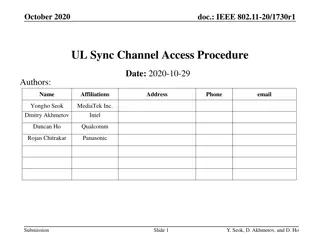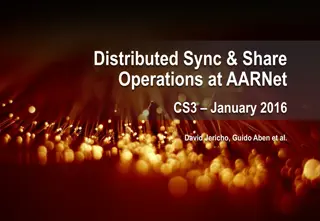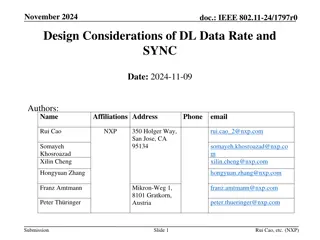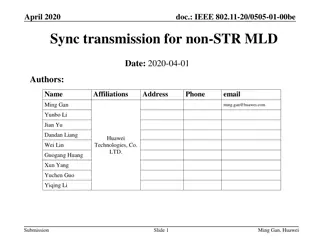
Carnegie Mellon Synchronization and Coordination
Explore the concepts of synchronization and coordination in computer systems through semaphores and locks at Carnegie Mellon University. Learn about mutual exclusion, shared resources management, and more. Enhance your understanding of system design and operation.
Download Presentation

Please find below an Image/Link to download the presentation.
The content on the website is provided AS IS for your information and personal use only. It may not be sold, licensed, or shared on other websites without obtaining consent from the author. If you encounter any issues during the download, it is possible that the publisher has removed the file from their server.
You are allowed to download the files provided on this website for personal or commercial use, subject to the condition that they are used lawfully. All files are the property of their respective owners.
The content on the website is provided AS IS for your information and personal use only. It may not be sold, licensed, or shared on other websites without obtaining consent from the author.
E N D
Presentation Transcript
Carnegie Mellon 14-513 18 18- -613 613 1
Carnegie Mellon Synchronization: Advanced 18-213/18-613: Introduction to Computer Systems 24th Lecture, April 16, 2024 2
Carnegie Mellon Review: Semaphores Semaphore: non-negative global integer synchronization variable Manipulated by P and V operations: P(s): [ while (s == 0) wait(); s--; ] Dutch for Proberen (test) V(s): [ s++; ] Dutch for Verhogen (increment) OS kernel guarantees that operations between brackets [ ] are executed indivisibly/atomically Only one P or V operation at a time can modify s. When while loop in P terminates, only that P can decrement s Semaphore invariant: s 0 3
Carnegie Mellon Review: Using Semaphores to Protect Shared Resources via Mutual Exclusion Basic idea: Associate a unique semaphore mutex, initially 1, with each shared variable (or related set of shared variables) Surround each access to the shared variable(s) with P(mutex) and V(mutex) operations mutex = 1 P(mutex) cnt++ V(mutex) 4
Carnegie Mellon Review: Using Lock for Mutual Exclusion Basic idea: Mutex is special case of semaphore that only has value 0 (locked) or 1 (unlocked) Lock(m): [ while (m == 0); m=0; ] Unlock(m): [ m=1] ~2x faster than using semaphore for this purpose And, more clearly indicates programmer s intention mutex = 1 mutex = 1 lock(mutex) cnt++ unlock(mutex) P(mutex) cnt++ V(mutex) vs. 5
Carnegie Mellon Note about Examples Lecture examples will use semaphores for both counting and mutual exclusion Code is much shorter than using pthread_mutex 6
Carnegie Mellon Review: Using Semaphores to Coordinate Access to Shared Resources Basic idea: Thread uses a semaphore operation to notify another thread that some condition has become true Use counting semaphores to keep track of resource state. Use binary semaphores to notify other threads. The Producer-Consumer Problem producer thread consumer thread Shared buffer Mediating interactions between processes that generate information and that then make use of that information Single entry buffer implemented with two binary semaphores One to control access by producer(s) One to control access by consumer(s) N-entry buffer implemented with semaphores + circular buffer 7
Carnegie Mellon Today Using semaphores to schedule shared resources CSAPP 12.5.4 Readers-writers problem Other concurrency issues Races Deadlocks Thread safety Interactions between threads and signal handling CSAPP 12.7 8
Carnegie Mellon Readers-Writers Problem W1 R1 Read/ Write Access Read-only Access W2 R2 W3 R3 Problem statement: Reader threads only read the object Writer threads modify the object (read/write access) Writers must have exclusive access to the object Unlimited number of readers can access the object concurrently Occurs frequently in real systems, e.g., Online airline reservation system Multithreaded caching Web proxy 9
Carnegie Mellon Readers/Writers Examples W1 R1 W2 R2 W3 R3 W1 R1 W2 R2 W3 R3 10
Carnegie Mellon Variants of Readers-Writers First readers-writers problem (favors readers) No reader should be kept waiting unless a writer has already been granted permission to use the object. A reader that arrives after a waiting writer gets priority over the writer. Second readers-writers problem (favors writers) Once a writer is ready to write, it performs its write as soon as possible A reader that arrives after a writer must wait, even if the writer is also waiting. Starvation (where a thread waits indefinitely) is possible in both cases. 11
Carnegie Mellon Solution to First Readers-Writers Problem Readers: Writers: void writer(void) { while (1) { P(&w); int readcnt; /* Initially 0 */ sem_t mutex, w; /* Both initially 1 */ void reader(void) { while (1) { P(&mutex); readcnt++; if (readcnt == 1) /* First in */ P(&w); V(&mutex); /* Writing here */ V(&w); } } rw1.c /* Reading happens here */ P(&mutex); readcnt--; if (readcnt == 0) /* Last out */ V(&w); V(&mutex); } } A reader that arrives after a waiting writer gets priority over the writer 12
Carnegie Mellon Readers/Writers Examples W1 R1 w = 1 readcnt = 0 W2 R2 W3 R3 W1 R1 w = 0 readcnt = 0 W2 R2 W3 R3 W1 R1 w = 0 readcnt = 2 W2 R2 W3 R3 13
Carnegie Mellon Solution to First Readers-Writers Problem Readers: Writers: void writer(void) { while (1) { P(&w); int readcnt; /* Initially 0 */ sem_t mutex, w; /* Both initially 1 */ void reader(void) { while (1) { P(&mutex); readcnt++; if (readcnt == 1) /* First in */ P(&w); V(&mutex); /* Writing here */ V(&w); } } rw1.c /* Reading happens here */ Arrivals: R1 R2 W1 R3 P(&mutex); readcnt--; if (readcnt == 0) /* Last out */ V(&w); V(&mutex); } } 14
Carnegie Mellon Solution to First Readers-Writers Problem Readers: Writers: void writer(void) { while (1) { P(&w); int readcnt; /* Initially 0 */ sem_t mutex, w; /* Both initially 1 */ void reader(void) { while (1) { P(&mutex); readcnt++; if (readcnt == 1) /* First in */ P(&w); V(&mutex); /* Writing here */ V(&w); } } rw1.c /* Reading happens here */ R1 Arrivals: R1 R2 W1 R3 P(&mutex); readcnt--; if (readcnt == 0) /* Last out */ V(&w); V(&mutex); } } readcnt == 1 w == 0 15
Carnegie Mellon Solution to First Readers-Writers Problem Readers: Writers: void writer(void) { while (1) { P(&w); int readcnt; /* Initially 0 */ sem_t mutex, w; /* Both initially 1 */ void reader(void) { while (1) { P(&mutex); readcnt++; if (readcnt == 1) /* First in */ P(&w); V(&mutex); /* Writing here */ V(&w); } } R2 rw1.c /* Reading happens here */ R1 Arrivals: R1 R2 W1 R3 P(&mutex); readcnt--; if (readcnt == 0) /* Last out */ V(&w); V(&mutex); } } readcnt == 2 w == 0 16
Carnegie Mellon Solution to First Readers-Writers Problem Readers: Writers: void writer(void) { while (1) { P(&w); int readcnt; /* Initially 0 */ sem_t mutex, w; /* Both initially 1 */ W1 void reader(void) { while (1) { P(&mutex); readcnt++; if (readcnt == 1) /* First in */ P(&w); V(&mutex); R2 /* Writing here */ V(&w); } } rw1.c R1 /* Reading happens here */ Arrivals: R1 R2 W1 R3 P(&mutex); readcnt--; if (readcnt == 0) /* Last out */ V(&w); V(&mutex); } } readcnt == 2 w == 0 17
Carnegie Mellon Solution to First Readers-Writers Problem Readers: Writers: void writer(void) { while (1) { P(&w); int readcnt; /* Initially 0 */ sem_t mutex, w; /* Both initially 1 */ W1 void reader(void) { while (1) { P(&mutex); readcnt++; if (readcnt == 1) /* First in */ P(&w); V(&mutex); /* Writing here */ V(&w); } } rw1.c /* Reading happens here */ R2 Arrivals: R1 R2 W1 R3 P(&mutex); readcnt--; if (readcnt == 0) /* Last out */ V(&w); V(&mutex); } } readcnt == 1 w == 0 R1 18
Carnegie Mellon Solution to First Readers-Writers Problem Readers: Writers: void writer(void) { while (1) { P(&w); int readcnt; /* Initially 0 */ sem_t mutex, w; /* Both initially 1 */ W1 void reader(void) { while (1) { P(&mutex); readcnt++; if (readcnt == 1) /* First in */ P(&w); V(&mutex); /* Writing here */ V(&w); } } R3 rw1.c /* Reading happens here */ Arrivals: R1 R2 W1 R3 R2 P(&mutex); readcnt--; if (readcnt == 0) /* Last out */ V(&w); V(&mutex); } } R1 readcnt == 2 w == 0 19
Carnegie Mellon Solution to First Readers-Writers Problem Readers: Writers: void writer(void) { while (1) { P(&w); int readcnt; /* Initially 0 */ sem_t mutex, w; /* Both initially 1 */ W1 void reader(void) { while (1) { P(&mutex); readcnt++; if (readcnt == 1) /* First in */ P(&w); V(&mutex); R3 /* Writing here */ V(&w); } } rw1.c /* Reading happens here */ Arrivals: R1 R2 W1 R3 P(&mutex); readcnt--; if (readcnt == 0) /* Last out */ V(&w); V(&mutex); } } readcnt == 1 w == 0 R2 20
Carnegie Mellon Solution to First Readers-Writers Problem Readers: Writers: void writer(void) { while (1) { P(&w); int readcnt; /* Initially 0 */ sem_t mutex, w; /* Both initially 1 */ W1 void reader(void) { while (1) { P(&mutex); readcnt++; if (readcnt == 1) /* First in */ P(&w); V(&mutex); /* Writing here */ V(&w); } } rw1.c /* Reading happens here */ Arrivals: R1 R2 W1 R3 P(&mutex); readcnt--; if (readcnt == 0) /* Last out */ V(&w); V(&mutex); } } readcnt == 0 w == 1 R3 21
Carnegie Mellon Other Versions of Readers-Writers Shortcoming of first solution Continuous stream of readers will block writers indefinitely Second version Once writer comes along, blocks access to later readers Series of writes could block all reads FIFO implementation See rwqueue code in code directory Service requests in order received Threads kept in FIFO Each has semaphore that enables its access to critical section 22
Carnegie Mellon Solution to Second Readers-Writers Problem void writer(void) { while (1) { P(&wmutex); writecnt++; if (writecnt == 1) P(&r); V(&wmutex); int readcnt, writecnt; // Initially 0 sem_t rmutex, wmutex, r, w; // Initially 1 void reader(void) { while (1) { P(&r); P(&rmutex); readcnt++; if (readcnt == 1) /* First in */ P(&w); V(&rmutex); V(&r) P(&w); /* Writing here */ V(&w); P(&wmutex); writecnt--; if (writecnt == 0); V(&r); V(&wmutex); } } /* Reading happens here */ P(&rmutex); readcnt--; if (readcnt == 0) /* Last out */ V(&w); V(&rmutex); } } A reader that arrives after a writer must wait, even if the writer is also waiting 23
Carnegie Mellon Managing Readers/Writers with FIFO Time Requests R R W R R R W W R W Allowed Concurrency Idea Read & Write requests are inserted into FIFO Requests handled as remove from FIFO Read allowed to proceed if currently idle or processing read Write allowed to proceed only when idle Requests inform controller when they have completed Fairness Guarantee every request is eventually handled 24
Carnegie Mellon Readers Writers FIFO Implementation Full code in rwqueue.{h,c} /* Queue data structure */ typedef struct { sem_t mutex; int reading_count; // Number of active readers int writing_count; // Number of active writers // FIFO queue implemented as linked list with tail rw_token_t *head; rw_token_t *tail; } rw_queue_t; // Mutual exclusion /* Represents individual thread's position in queue */ typedef struct TOK { bool is_reader; sem_t enable; // Enables access struct TOK *next; // Allows chaining as linked list } rw_token_t; 25
Carnegie Mellon R R W R R R W W Readers Writers FIFO Use In rwqueue-test.c /* Get write access to data and write */ void iwriter(int *buf, int v) { rw_token_t tok; rw_queue_request_write(&q, &tok); /* Critical section */ *buf = v; /* End of Critical Section */ rw_queue_release(&q); } Enqueue write request. Blocked until its your turn. (One writer per turn) /* Get read access to data and read */ int ireader(int *buf) { rw_token_t tok; rw_queue_request_read(&q, &tok); /* Critical section */ int v = *buf; /* End of Critical section */ rw_queue_release(&q); return v; } Enqueue read request. Blocked until its your turn. (Multiple readers OK in same turn) 26
Carnegie Mellon Library Reader/Writer Lock Data type pthread_rwlock_t Operations Acquire read lock Pthread_rwlock_rdlock(pthread_rw_lock_t *rwlock) Acquire write lock Pthread_rwlock_wrlock(pthread_rw_lock_t *rwlock) Release (either) lock Pthread_rwlock_unlock(pthread_rw_lock_t *rwlock) Observation Library must be used correctly! Up to programmer to decide what requires read access and what requires write access 27
Carnegie Mellon Today Using semaphores to schedule shared resources Readers-writers problem Other concurrency issues Races Deadlocks Thread safety Interactions between threads and signal handling 28
Carnegie Mellon Recall: One Worry: Races A race occurs when correctness of the program depends on one thread reaching point x before another thread reaches point y /* a threaded program with a race */ int main(int argc, char** argv) { pthread_t tid[N]; int i; for (i = 0; i < N; i++) Pthread_create(&tid[i], NULL, thread, &i); for (i = 0; i < N; i++) Pthread_join(tid[i], NULL); return 0; } /* thread routine */ void *thread(void *vargp) { int myid = *((int *)vargp); printf("Hello from thread %d\n", myid); return NULL; } race.c 29
Carnegie Mellon Race Elimination Don t share state E.g., use malloc to generate separate copy of argument for each thread Use synchronization primitives to control access to shared state Different shared state can use different primitives 30
Carnegie Mellon Today Using semaphores to schedule shared resources Producer-consumer problem Other concurrency issues Races Deadlocks Thread safety Interactions between threads and signal handling 31
Carnegie Mellon Another Worry: Deadlock Def: A process is deadlocked iff it is waiting for a condition that will never be true. Typical Scenario Processes 1 and 2 needs two resources (A and B) to proceed Process 1 acquires A, waits for B Process 2 acquires B, waits for A Both will wait forever! More fully (and beyond the scope of this course), a deadlock has four requirements Mutual exclusion Circular waiting Hold and wait No pre-emption 32
Carnegie Mellon Deadlocking With Semaphores int main(int argc, char** argv) { pthread_t tid[2]; Sem_init(&mutex[0], 0, 1); /* mutex[0] = 1 */ Sem_init(&mutex[1], 0, 1); /* mutex[1] = 1 */ Pthread_create(&tid[0], NULL, count, (void*) 0); Pthread_create(&tid[1], NULL, count, (void*) 1); Pthread_join(tid[0], NULL); Pthread_join(tid[1], NULL); printf("cnt=%d\n", cnt); return 0; } void *count(void *vargp) { int i; int id = (int) vargp; for (i = 0; i < NITERS; i++) { P(&mutex[id]); P(&mutex[1-id]); cnt++; V(&mutex[id]); V(&mutex[1-id]); } return NULL; } Tid[0]: P(s0); P(s1); cnt++; V(s0); V(s1); Tid[1]: P(s1); P(s0); cnt++; V(s1); V(s0); 33
Carnegie Mellon Deadlock Visualized in Progress Graph Locking introduces the potential for deadlock: waiting for a condition that will never be true Thread 1 Deadlock state Forbidden region for s0 V(s0) Any trajectory that enters the deadlock region will eventually reach the deadlock state, waiting for either s0 or s1 to become nonzero V(s1) P(s0) Forbidden region Deadlock region Other trajectories luck out and skirt the deadlock region for s1 P(s1) Thread 0 Unfortunate fact: deadlock is often nondeterministic (race) P(s0) P(s1) V(s0) V(s1) s0=s1=1 34
Carnegie Mellon Avoiding Deadlock int main(int argc, char** argv) { pthread_t tid[2]; Sem_init(&mutex[0], 0, 1); /* mutex[0] = 1 */ Sem_init(&mutex[1], 0, 1); /* mutex[1] = 1 */ Pthread_create(&tid[0], NULL, count, (void*) 0); Pthread_create(&tid[1], NULL, count, (void*) 1); Pthread_join(tid[0], NULL); Pthread_join(tid[1], NULL); printf("cnt=%d\n", cnt); return 0; } Acquire shared resources in same order void *count(void *vargp) { int i; int id = (int) vargp; for (i = 0; i < NITERS; i++) { P(&mutex[0]); P(&mutex[1]); cnt++; V(&mutex[id]); V(&mutex[1-id]); } return NULL; } Tid[0]: P(s0); P(s1); cnt++; V(s0); V(s1); Tid[1]: P(s0); P(s1); cnt++; V(s1); V(s0); 35
Carnegie Mellon Avoided Deadlock in Progress Graph Thread 1 No way for trajectory to get stuck Processes acquire locks in same order Forbidden region for s0 V(s0) Order in which locks released is immaterial V(s1) P(s1) Forbidden region for s1 P(s0) Thread 0 P(s1) V(s0) P(s0) V(s1) s0=s1=1 36
Carnegie Mellon Demonstration See program deadlock.c 100 threads, each acquiring same two locks Risky mode Even numbered threads request locks in opposite order of odd- numbered ones Safe mode All threads acquire locks in same order 37
Carnegie Mellon Livelock Visualized in Progress Graph Livelock is similar to a deadlock, except the threads change state, but remain in a deadlock trajectory. Thread 1 Livelock state Forbidden region for s0 Forbidden region Livelock region for s1 Thread 0 38
Carnegie Mellon Deadlock, Livelock, Starvation Deadlock One or more threads is waiting on a condition that will never be true Livelock One or more threads is changing state, but will never leave a deadlock / livelock trajectory Starvation One or more threads is temporarily unable to make progress 39
Carnegie Mellon Quiz Time! Canvas Quiz: Day 24 Synchronization Advanced 40
Carnegie Mellon Today Using semaphores to schedule shared resources Readers-writers problem Other concurrency issues Races Deadlocks Thread safety Interactions between threads and signal handling 41
Carnegie Mellon Crucial concept: Thread Safety Functions called from a thread must be thread-safe Def: A function is thread-safe iff it will always produce correct results when called repeatedly from multiple concurrent threads. Classes of thread-unsafe functions: Class 1: Functions that do not protect shared variables Class 2: Functions that keep state across multiple invocations Class 3: Functions that return a pointer to a static variable Class 4: Functions that call thread-unsafe functions 42
Carnegie Mellon Thread-Unsafe Functions (Class 1) Failing to protect shared variables Fix: Use P and V semaphore operations (or mutex) Example: goodcnt.c Issue: Synchronization operations will slow down code 43
Carnegie Mellon Thread-Unsafe Functions (Class 2) Relying on persistent state across multiple function invocations Example: Random number generator that relies on static state static unsigned int next = 1; /* rand: return pseudo-random integer on 0..32767 */ int rand(void) { next = next*1103515245 + 12345; return (unsigned int)(next/65536) % 32768; } /* srand: set seed for rand() */ void srand(unsigned int seed) { next = seed; } 44
Carnegie Mellon Thread-Safe Random Number Generator Pass state as part of argument and, thereby, eliminate static state /* rand_r - return pseudo-random integer on 0..32767 */ int rand_r(int *nextp) { *nextp = *nextp*1103515245 + 12345; return (unsigned int)(*nextp/65536) % 32768; } Consequence: programmer using rand_r must maintain seed 45
Carnegie Mellon Thread-Unsafe Functions (Class 3) /* Convert integer to string */ char *itoa(int x) { static char buf[11]; sprintf(buf, "%d", x); return buf; } Returning a pointer to a static variable Fix 1. Rewrite function so caller passes address of variable to store result Requires changes in caller and callee char *lc_itoa(int x, char *dest) { P(&mutex); strcpy(dest, itoa(x)); V(&mutex); return dest; } Fix 2. Lock-and-copy Requires simple changes in caller (and none in callee) However, caller must free memory. 46
Carnegie Mellon Thread-Unsafe Functions (Class 4) Calling thread-unsafe functions Calling one thread-unsafe function makes the entire function that calls it thread-unsafe Fix: Modify the function so it calls only thread-safe functions 47
Carnegie Mellon Reentrant Functions Def: A function is reentrant iff it accesses no shared variables when called by multiple threads. Important subset of thread-safe functions Require no synchronization operations Only way to make a Class 2 function thread-safe is to make it reentrant (e.g., rand_r ) All functions Thread-safe functions Thread-unsafe functions Reentrant functions 48
Carnegie Mellon Thread-Safe Library Functions All functions in the Standard C Library (at the back of your K&R text) are thread-safe Examples: malloc, free, printf, scanf Most Unix system calls are thread-safe, with a few exceptions: Thread-unsafe function asctime ctime gethostbyaddr gethostbyname inet_ntoa localtime rand Class 3 3 3 3 3 3 2 Reentrant version asctime_r ctime_r gethostbyaddr_r gethostbyname_r (none) localtime_r rand_r 49
Carnegie Mellon Today Using semaphores to schedule shared resources Readers-writers problem Other concurrency issues Races Deadlocks Thread safety Interactions between threads and signal handling 50










